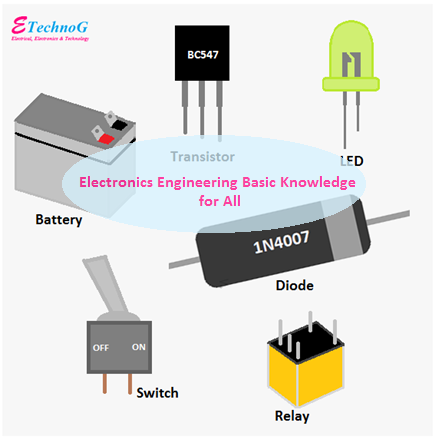Electronics Engineering Basic Knowledge for All
Hey, in this article we are going to discuss about the basics of electronics engineering. As an electronics engineering student or teacher or professional, you must have the basic knowledge. So, this article covers - basic electronics concepts, a clear idea of basic electronics topics, and component identification.
Before going to read the full article, have you know what is the difference between Electrical and Electronics? Anyway, I am telling in short, electrical mainly deals with power generation, transmission, distribution, and consumption with high voltage and current whereas electronic mostly deals with electricity controlling, and conversion with low voltage and current. Yes, in electronics electricity is used and controlled in a very complicated way. For, example, in a microprocessor, you cannot imagine how electricity is controlled in a complicated way.
Basic Electronics Topics
Electronics Engineering mainly deals with smaller circuits with more control, processing, circuit integration, low power consumption, cheaper and compact designing, portable, higher efficiency, etc. Generally, in the first stage of basic electronics gives you a clear idea of electricity, current, voltage, and power.
Concept of Electricity
Electricity is a form of energy that is transferred by the flow of electric current. Electricity or electrical energy is clean energy and is easy to transfer, convert, or store. Nowadays almost 90 percent of our useful work can be done with electrical energy. You can see the examples and applications of electricity in air conditioning, lighting, motor, pumps, elevators, heaters, coolers, fans, etc. And electricity or electrical energy can be generated by Different sources, methods, or devices. For example, an electric generator generates electric energy by converting from mechanical energy and the solar panel generates electrical energy by converting from solar or photon energy.
Current
An Electric Current is the flow of electrons through a conductive path, object, or any material. The flow of electric current depends upon the pressure or potential difference or voltage between the two ends of the conductor and the internal resistance of the conductor. The unit of current is ampere.
Voltage
In simple words, voltage is the electric pressure that forces to flow the electrons through a conductor. And this pressure is created when a potential difference is applied across the two ends of that conductor. The unit of voltage is volt.
Power
Mathematically, power is the multiplication of voltage and current. Power is measured by the flow of current from a power source to load with applied voltage. The unit of power is the watt.
Energy
Energy is the rate of power consumed per time. For, example, when 1Kwh power is consumed for 1 hour, then energy can be calculated by 1Kwh/hour.
Read Also:
Learning about Basic Electronic Component
Learning about electronic components will strengthen your basic knowledge of electronics engineering.
Resistor
A resistor is a passive component that opposes the flow of current in an electrical or electronic circuit. Another function of a resistor or resistive material is to convert electrical energy into heat energy. The property of a resistor is called resistance. The unit of resistance is the ohm.
Inductor
An inductor is also a passive component. The main function of an inductor is to oppose the changes in the flow of current through it. The inductor blocks the alternating current or AC and allows the Direct Current or DC. The property of the inductor is called inductance. The unit of inductance is Henry.
Capacitor
A capacitor is a passive component whose main function is to store electrical energy in the form of an electric charge. The property of a capacitor is opposite to an inductor means, the capacitor blocks the direct current(DC) and allows the alternating current(AC). The property of a capacitor is called Capacitance. And the unit of the capacitor is called a farad. Basically, the capacitor is a two-terminal device.
Semiconductor Devices
Having a background in electronics engineering, you must know about important semiconductor devices such as transistors, diodes, and ICs. IC means Integrated Circuit. In our blog, we have so many articles about those semiconductor devices. So, you can read about them.
Basics Symbols in Electronics Engineering
You must know about basic electronic symbols such as a resistor, inductors, capacitors, transistors, and other electronic components. Not only electronic components but even having knowledge of circuit symbols, and electronic drawing symbols are also very important.
Here, I give some links to important articles related to electronics engineering. So, you can read these articles to increase your basic knowledge.
Read Also:
This was a very simple and basic concept of electronics engineering. If you want to be an expert in the field of electronics engineering you must gather more knowledge. Remember that, building a strong foundation takes time and effort. Be patient, stay motivated, and enjoy the process of learning and exploring the exciting world of electronics engineering.
Here are a few additional tips for how you can increase your knowledge,
- Participate in online forums, discussion groups, and social media communities dedicated to electronics engineering. Engage with experienced engineers and professionals and ask them questions. And always try to learn from their insights and experiences.
- Only theoretical knowledge is not enough to strengthen your skills. Apply your theoretical knowledge to practical projects. Start with simple circuits and gradually move on to more complex projects. Hands-on experience will help you understand the practical aspects of electronics engineering and increase your understanding capabilities of the concepts.
- In this modern era, if you seat, you will finish. So stay updated with the latest advancements and trends in electronics engineering. Read industry publications, research papers, and technology news to stay abreast of new developments.

